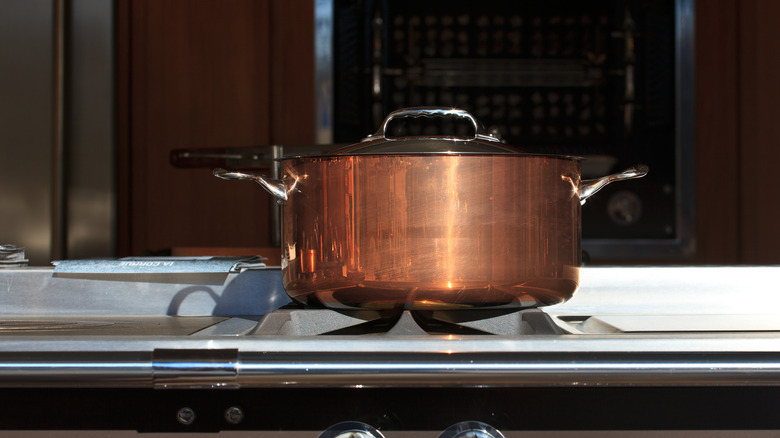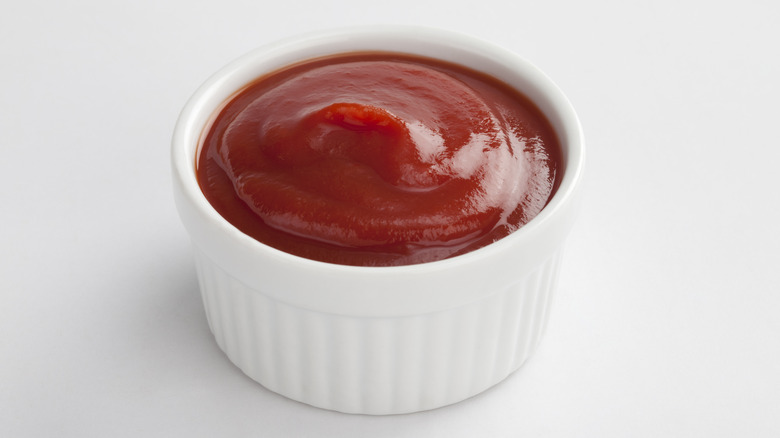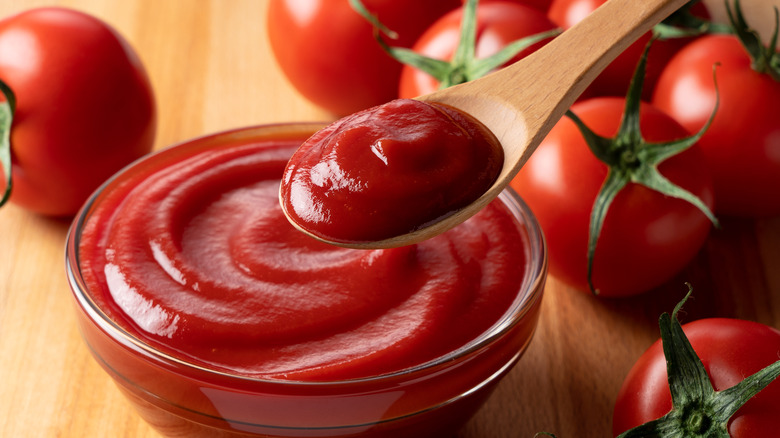The Restaurant Ketchup Trick To Make Copper Pans Look Like New
When you think of cleaning agents, you probably aren't thinking of ketchup. In fact, you'd probably consider ketchup one of the messiest things in your kitchen. And who could blame you? It can stain your clothes, leave behind that weird watery mess when the bottle's almost empty, and it can leave a red stain on your plates and Tupperware. Suffice it to say, you have all the reason to believe that you can't clean anything with ketchup.
But what's all this about chefs using ketchup to clean their pans? You may not be a pro chef, but smearing condiments on your pans and pots seems kind of counter-intuitive, right? While you would ordinarily be correct, this surprisingly isn't a joke. A good way to clean stains from copper pans is to dab a bit of ketchup on a dish towel (whether or not the ketchup is Heinz doesn't seem to really matter) and then rub your copper pot or pan all over with it. Make sure to scrub the stains and tough spots. Once the pot or pan has been "cleaned," run it under warm water and soap until the ketchup is washed off. This method should result in a bright, shining copper pot that looks as if you just took it out of the box.
How exactly does this work? What is it about ketchup that, despite its messy properties, makes it so good for cleaning copper?
Ketchup is a very acidic condiment
When you think of foods that are acidic, you most likely think of things like lemons or oranges. It may come as a surprise to you that ketchup is an acidic food, too. It may not be as acidic as a shot of lemon juice, sure, but if you've ever noticed a subtle tang in your ketchup or a raw tomato, that's acid all the same.
It's the acid in tomatoes that makes ketchup so good as a cleaner. The amount of acid is abrasive enough that it can work to dissolve tough stains or spots, but weak enough that it won't damage or scar the surface of your copper pot or brass pan. While you will still need water and soap to clean the dish afterward to keep the ketchup from hardening on the surface, buffing out a hard stain with a dab or two of ketchup will be enough to clean it without much trouble.
If you, for some reason, don't happen to have ketchup on hand to clean your pans, other tomato-based products can work just as well. A few dabs of tomato paste on a tough stain will have the same cleaning effect as a bottle of ketchup. If the tomato paste isn't working as effectively as you hoped, you could try mixing it with some vinegar or a sprinkle of salt — both of which have good abrasive properties to help remove tough food stains.
You can also use ketchup on silver and cast iron
Have some good silver utensils you used for dinner one evening that are now caked in stains and stuck-on leftovers? Maybe you have a cast-iron pan that you don't want to ruin by using soap pads? Does your car look like it could use a good shine, but you don't want to pay to get it waxed? You needn't worry — so long as you have ketchup, you can make just about anything shine like new.
Ketchup's gentle but abrasive properties make it a rather versatile cleaning agent outside of the kitchen. By adding a squirt of ketchup to a dishcloth or toothbrush, you can very easily clean or spiff up anything from the dirtiest of silverware to the hood of your car. Of course, this isn't recommended for enormous cleaning jobs — what would the neighbors say if they saw you hitting your car with bottles of ketchup? But this is best saved for minor touch-ups that don't require extensive amounts of time.
Much like how baking soda is a popular and common method for cleaning spills or stains, ketchup can be a valuable tool for cleaning precious metals like silver or copper without worrying about damaging them. So long as you use ketchup correctly, you can enjoy the benefits of a clean copper pot, polished silverware, or even an impressively clean hood and still have enough left over to serve with some fries.


